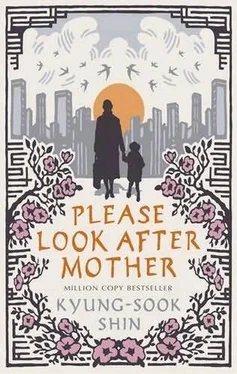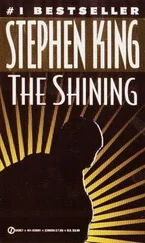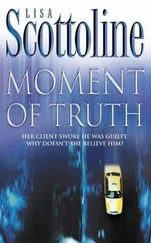When he reached her, Mom took an envelope from her pocket and put it in his hand. “Now all you need is a nameplate. Use this money to get a nameplate.” He looked at Mom, the bulging envelope in his fist. “I’m sorry that I couldn’t help you buy this house,” she said.
Later, coming back from the bathroom in the early dawn, he opened the door of Mom’s room quietly. Mom and Chi-hon were lying side by side, deep in slumber. Mom seemed to be smiling in her sleep; his sister’s arm was, as ever, flung away from her body, freely.
Before that, from her first night with him in the night duty room, there hadn’t been a comfortable place for Mom to stay in Seoul. Often he and his siblings went to meet her when she came to Seoul on a chartered bus to attend a relative’s wedding. Mom would have a huge load with her. Before the wedding was even over, she would rush him and his siblings to the rented room they were living in. She’d take off the suit she’d worn to the wedding; food wrapped in newspaper or plastic or squash leaves would tumble out of her bundles. It didn’t take even a minute for Mom to change into a loose shirt and a pair of floral-print pants, which she’d brought rolled up in a corner of one of her bags. The side dishes that came out of the newspapers and plastic and squash leaves were moved onto plates and into bowls from the cupboard, and Mom brushed off her hands, quickly peeled the covers off the blankets, and washed them. She made kimchi with the salted cabbage she had brought, and scrubbed the pot that had turned black from the coal fire, and cleaned the portable stove until it shone, and sewed the covers back on the blankets after they dried in the sun on the roof, and washed rice and made bean-paste soup and set the table for supper. On the table were generous portions of stewed beef, sautéed anchovies, and sesame-leaf kimchi she’d brought from home. When he and his siblings took a spoonful of rice, Mom placed a piece of stewed beef on each person’s spoon. They urged her to eat, but she insisted, “I’m not hungry.” After they were done, she cleaned up and filled the rubber basin under the tap with water. She’d go out to buy a watermelon to keep cool in the basin, and then she’d quickly change back into her suit, the only one she had, which she wore only for weddings; then she’d say, “Take me back to the station.” It would already be late. “Spend the night and go home tomorrow, Mom,” they would say. But she would reply, “I have to go. I have things to do tomorrow.” The only thing Mom had to do was work in the rice paddies or the fields; that kind of work could wait until the following day. But Mom always went back on the train that same night. Even though it was really because there was only one room, a small room where her three grown children had to sleep huddled together, unable to move about, Mom just said, “I have to go. I have things to do tomorrow.”
He always made renewed resolutions when he brought Mom, exhausted, back to Seoul Station to wait for the night train so she could return home empty-handed. I’ll make money and move to a two-room place. I’ll rent a house. I’ll buy a house in the city. Then I’ll be able to have a room that this woman can sleep in comfortably . He bought a platform ticket whenever Mom took the night train so he could accompany her to the platform. He would find Mom a seat on the train and hand her a bag full of snacks, maybe banana milk or tangerines.
“Don’t fall asleep; remember to get off at Chongup Station.”
Mom commanded him-sometimes sadly, sometimes firmly, “Here in the city, you are your siblings’ father and mother.”
As he stood there, rubbing his hands together, only twenty-some years old, Mom would get up from her seat and open his hands and straighten his shoulders. “The eldest brother has to be dignified. He has to be the role model. If the eldest brother goes the wrong way, his siblings will go that way, too.”
When the train was about to leave, Mom’s eyes would fill with tears, and she’d say, “I’m sorry, Hyong-chol.”
It would be in the middle of the night when his mom got off at Chongup. The first bus to town would be after six in the morning. His mom would get off the train and walk, in the dark, toward home.

“I wish we’d brought more flyers to post around here,” he says, burrowing into his jacket against the night chill.
“I’ll come back tomorrow and do that,” Chi-hon assures him, and she pushes her hands into her pockets.
Tomorrow he has to escort the CEO’s aides to the model apartment in Hongchon. He can’t afford to excuse himself. “Should I have my wife do it?”
“Let her rest. She’s taking care of Father, too.”
“Or you can call the youngest.”
“Or he’ll help me.”
“He?”
“Yu-bin. When we find Mom, I’m going to marry him. Mom always wanted me to get married.”
“If it’s that easy to make up your mind, you should have done it already.”
“After Mom went missing, I realized that there’s an answer to everything. I could have done everything she wanted me to. It wasn’t important. I don’t know why I got under her skin over things like that. I’m not going to get on a plane anymore, either.”
He pats his sister’s shoulder and sighs. Mom didn’t like it when his sister got on a plane and went abroad. Mom’s opinion was that if it was during war you couldn’t help it, but otherwise you couldn’t leave your life up to fate like that, as if you didn’t care a whit about it. When Mom’s meddling about planes got worse, his sister boarded them in secret. Whether it was for business or for pleasure, if she had to take a plane, she left without telling Mom.
“The roses at that house were so beautiful…,” his sister says.
He looks at her in the dark. He has just been thinking about those roses. The first spring after he bought his house, Mom visited and suggested they go buy roses. Roses? When the word came out of his mom’s mouth he had to ask, “You do mean roses?” as if he’d misheard her.
“Red roses. Why? Isn’t there a place that sells them?”
“Yes, there is.” He took Mom to a nursery that supplied the saplings lining the streets in Kupabal. “I think this is the prettiest flower,” Mom said, and bought many more rosebushes than he had expected. Later that afternoon, she dug holes near the wall around his house and planted them. He had never seen Mom plant something to look at, not to harvest and eat, like beans or potatoes or seedlings of cabbage or radishes or peppers. Watching over her bent form, he asked whether she was planting the roses too close to the wall. Mom looked up at him and said, “That’s so that people outside can enjoy them, too.” Every spring, the roses came into full blossom. People passing by outside during the rose season paused under the wall and inhaled the scent of roses, just as Mom had hoped. After it rained, red rose petals would be strewn everywhere, having fallen on the other side of the wall.
At the bar in the big box store in Yokchon-dong, his sister, who downed two draft beers in place of dinner, takes out a notebook from her bag, opens it to a particular page, and pushes it toward him. Her face is flushed from drinking on an empty stomach. He tilts the notebook toward the light and reads. Unlike her imaginative and emotional personality, her handwriting is surprisingly compact.
I want to read to children who cannot see.
I want to learn Chinese.
If I earn a lot of money, I want to own a small theater.
I want to go to the South Pole.
I want to go on a pilgrimage to Santiago.
Underneath were thirty more sentences starting with “I.”
Читать дальше












